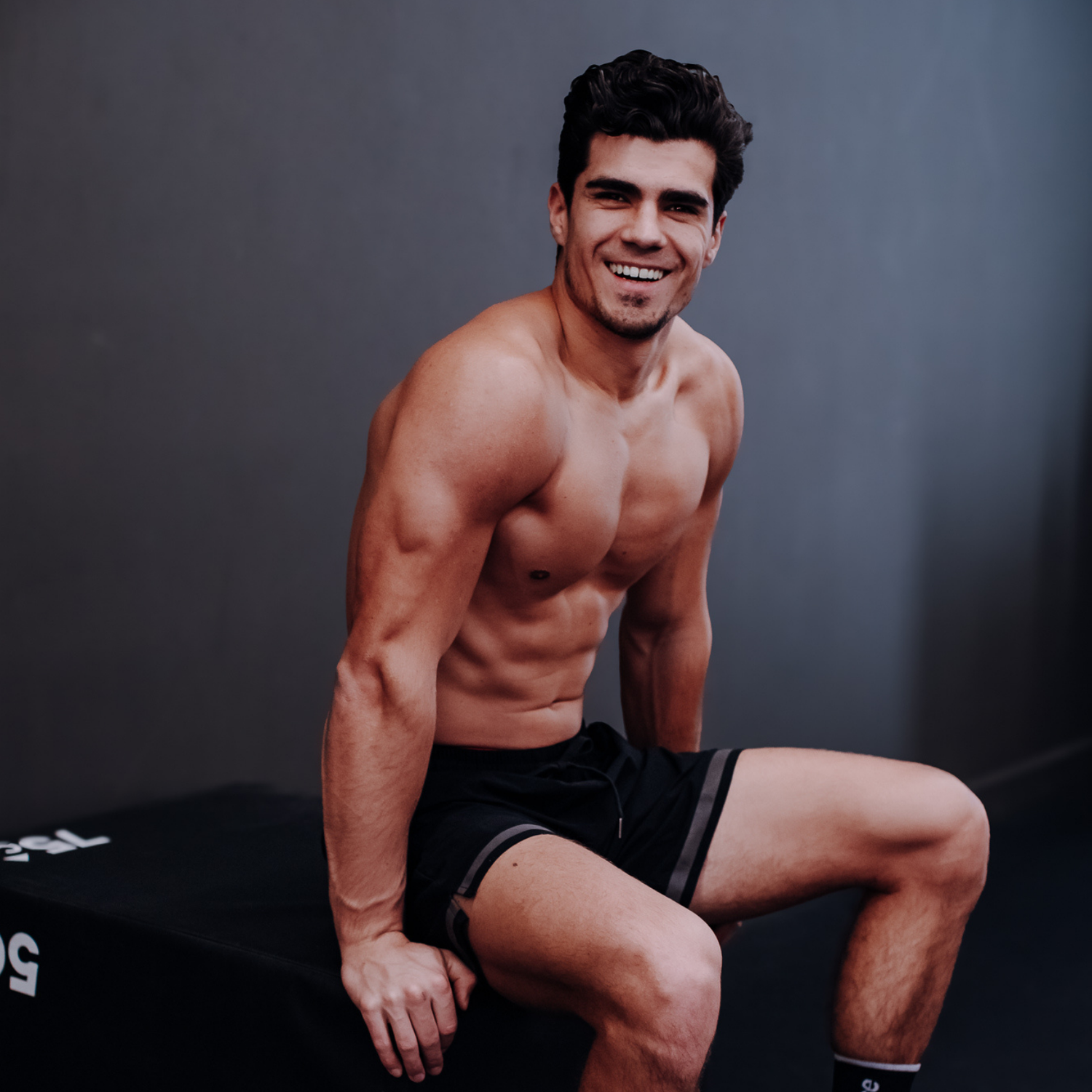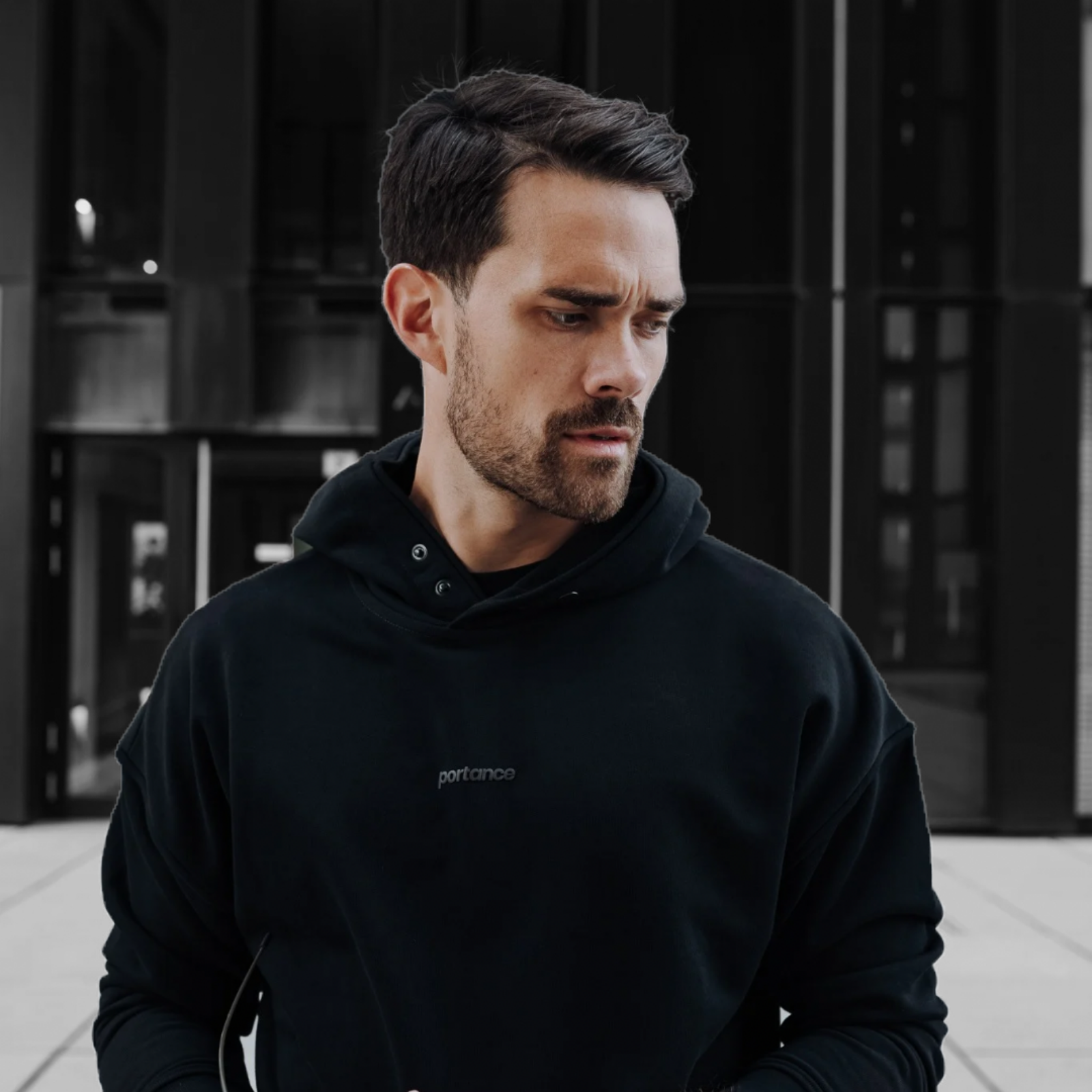In unserem Interview mit Marius Enzo spricht das 27-jährige Sport- und Fashionmodel über seinen Weg von der Sporthochschule Köln hin zu einem unabhängigen, abenteuerlichen Lebensstil. Marius hat sich für eine freiere Laufbahn entschieden und kombiniert heute Outdoor-Sportarten wie Parkour, Calisthenics und Klippenspringen mit seiner Modelkarriere.

portance: Hallo Marius, erzähl uns doch ein bisschen über dich und deinen Weg. Wer bist Du und was machst Du?
Marius: Okay, gerne! Ich bin Marius, bin 27 und komme aus dem schönen Königswinter. Ich habe in Köln an der Sporthochschule studiert und dann auch meinen Master in Bochum begonnen. Aber habe dann irgendwann für mich gemerkt, dass ich eher die Welt bereisen will. Habe dann damals remote für eine Softwarefirma gearbeitet und mich dann aber irgendwann selbstständig als Sport- und Fashionmodel gemacht. Und bin jetzt so gesehen seit anderthalb Jahren komplett dem dedicated und probiere mich dabei aus.
Parallel mache ich viele Outdoor-Sportarten, unter andrem Parcours, Calsithenics und im Sommer Klippenspringen. Und ich liebe eigentlich alles draußen in der Natur, klettern gehen oder wandern. Also bin da eigentlich so eher der OutdoorBursche und liebe es auch einfach in der Natur zu sein, sei es im Sommer oder im Winter.
Portance: Und was hast du im Bachelor genau studiert?
Marius: Der Studiengang hieß Sportwissenschaften und ich war im Profil Sport, Erlebnis und Bewegung. Wir haben dabei den Fokus mehr auf Bewegungsvermittlung von Übungen, von Biomechanik im Körper gelegt und eben nicht nur dieses reine „Sportlehrer-Ding“, wo man oft viel Pädagogik mit Kindern im Sport lernt.
Portance: Das heisst du hattest auch Sport Leistungskurs in der Schule?
Marius: Genau, Im Studium war es dann aber auch viel Anatomie lernen und du musst Physiologie beherrschen. Also jetzt sowas wie der Stoffwechsel beim Laufen, wie das dann mit der Atmung und so funktioniert. Und du kannst natürlich auch dann da in die Wissenschaft gehen und krasse Studien machen und dein PhD und Dozent werden an der Uni. Aber ich war immer so, würde ich sagen, gutes Mittelmaß. Vor allem in der Praxis war ich immer sehr gut. Aber so theoretisch, da war ich immer zu ungeduldig für..

Portance: Also bist du eher so der Macher anstatt der Theoretiker?
Marius: Ja, ganz genau. Ich mag eher die Action. Ich wurde immer schnell abgelenkt. Und ich glaube, das, was ich jetzt gerade mache, ist ganz gut, weil ich sehr spontan sein muss. Mal fliegt man dann irgendwo spontan vielleicht zu einem Shooting, weil man ein Cooles bekommen hat. Also ich mag es halt, mich spontan auf Dinge einzustellen.
Portance: Gab es Vorbilder, die dich auf deinem Weg geprägt haben?
Marius: Absolut. Mein Bruder und ich haben früher Fitness-YouTuber wie Mischa Janjic und Karl Ess. verfolgt. Die beiden haben uns mit ihrer Idee eines „kettenlosen Lebens“ inspiriert. Sie lebten vor, wie man finanziell frei und gleichzeitig leidenschaftlich leben kann. Ich fand die Idee faszinierend, die Welt zu bereisen, gesund zu leben und dabei den eigenen Weg zu gehen. Heute sehe ich solche Vorbilder etwas kritischer, aber ihre Grundidee hat mich nachhaltig geprägt.
Portance: Und wie kamst du dann zum Modeln?
Marius: Ja das war auch eher zufällig. Ich habe bei Instagram oft Bilder aus dem Urlaub hochgeladen oder vom Training. Und dann habe ich mal mit einem Kumpel gesprochen, der bei einer Modelagentur war er meinte: “Schick den Agenturen einfach Polaroid-Bilder von dir!“ Und dann hab ich's gemacht. Klar, am Anfang kriegt man nur Absagen und da heißt es dann deine Haare seien zu kurz oder du seist zu trainiert und all solche Dinge. Irgendwann hat das geklappt und so bin ich da reingerutscht und habe dann, während ich noch angestellt parallel meine ersten Shootings gehabt. So habe ich mich da Step-by-Step da rangetastet.
Mindset ist für mich die Grundlage. Aber es bringt nichts, wenn man es nicht in die Tat umsetzt.
Portance: Was bedeutet für dich Mindset? Wie gehst du damit um?
Marius: Mindset ist auf jeden Fall ein Thema. Mindset ist für mich die Grundlage, aber es bringt nichts, wenn man es nicht in die Tat umsetzt. Früher habe ich Zitate und Gedanken von Leuten wie David Goggins oder Jordan Peterson gesammelt, um mich zu motivieren. Aber irgendwann habe ich gemerkt, dass die beste Motivation das Handeln ist. Mein Ansatz heute: Einfach anfangen. Kleine Schritte bringen dich oft weiter als perfektes Planen. Ich glaube, die Leute denken immer zu viel, dass irgendwie ihr Mindset Büchlein ihre Probleme löst. Oder sie lesen dann fünf Bücher über tolle Habits oder ähnliches. Aber du musst einfach anfangen und so war es bei mir auch.
Portance: Wie bleibst du motiviert und diszipliniert, sowohl als Fitness-Model als auch in deinem Alltag?
Marius: Disziplin ist entscheidend, vor allem, wenn manchmal die Motivation etwas low ist. ich bin auch öfter unmotiviert, vor allem jetzt beim Training. Wenn man was Neues macht, dann ist dann sind 10% Motivation und 90% Disziplin. Man muss man zum Training einfach hingehen, auch wenn man keine Lust hat. Und motiviert bleib ich vor allem wenn ich andere Leute sehe. Hier orientiere ich mich an Menschen, die etwas Außergewöhnliches leisten, wie zum Beispiel dem Klippenspringer Jérémy. Seine Geschichte zeigt, dass man auch mit einer kleinen Leidenschaft große Dinge erreichen kann und das step-by-step, wenn man konstant dran bleibt. So etwas zeigt, dass es machbar ist.

Portance: Gibt's bestimmte Routinen, die hast? Vielleicht etwas in den Bereichen Ernährung, Sport?
Marius: Also, ich würd sagenmein Alltag ist manchmal schon eher ein bisschen „durchwühlt“. Daher merke ich, dass gute Routinen mir z.B. immer am meisten beim Thema Essen helfen. Mittlerweile weiß ich zum Beispiel gefühlt an jedem Bahnhof, wo ein Bio-Bäcker ist, da hole ich mir da drei Bio-Brötchen und nehme mir von zu Hause gekochte Eier mir, die habe ich dann immer dabei. Also so gute Bio-Eier, weißt du? Oder ich habe immer Skyr dabei. Dann merke ich wenn mein Alltag dann vielleicht mal chaotisch war oder unstrukturiert, dann geht es mir durch die bessere Ernährung zumindest gut und ich habe eine Konstante. Ich trinke eigentlich auch fast jeden Tag einmal so einen Ingwer-Shot, als eine Art Booster, anstatt irgendwie einen billigen Energy-Drink.
Also für mich ist, glaube ich, das Wichtigste an gesunden Routinen das Essen, Schlafen und seine Termine im Kopf haben. Eine Zeit lang habe ich auch HabitTracker verwendet, das mache ich aber nicht mehr. Ich bin auch der Meinung, dass es viele Leute gibt, due Routinen nur machen einfach deshalb, damit sie eine Habits haben. Aber im Endeffekt musst du ja wirklich die Sachen finden, die dir auch wirklich helfen.
Portance: Was motiviert dich, morgens aufzustehen?
Marius: Boah, definitiv für mich eigentlich Sport und dass ich in dem, was ich mache, besser werden will. Vor allem, wenn ich so was vorhabe, wie zB jetzt, wo ich aktuell für Ninja Warrior trainiere. Vielleicht aber auch beim Reisen wenn wir jetzt zum Beispiel sagen wir mal einige Wochen in Frankreich beim campen sind. Da freue ich mich dann morgens schon, dass wir da halt Klippen springen können. Also solche Sachen. Einfach geile Tage zu haben, mich mit coolen Leuten zu treffen. Auch wenn ich weiß: „Okay, ich gehe erst in die City, arbeite am Laptop und danach gehe ich abends mit einem Kumpel trainieren
Portance: Wie oft machst Du Sport?
Marius: Also ich probiere schon so vier, fünf Mal die Woche. Es kommt aber auch darauf an, was ansteht, also sagen wir mal, wenn jetzt im Sommer, ich dann mehr so vielleicht draußen Parkour oder mal Turmspringen im Freibad, dann ist das eher der Sport, dann gehe ich auch vielleicht weniger trainieren. Im Winter, so wie jetzt, wenn man weniger so Fun-Sportarten machen kann, dann gehe ich auch einfach ins Fitti, zum Calisthenics oder in der Kletterhalle oder in der Ninja Warrior Halle und dann trainiert man da zwei, drei Stündchen. Aber ich denke schon so vier Mal die Woche probiere ich es

Portance: Hast Du dabei gerade eine Lieblingsübung?
Marius: Derzeit, alles, was mit so Swings zu tun hat, vor allem mit Parkour, also irgendwie „hoch“, sage ich mal, so Muscle-Ups mit rausschwingen. Also so dieser dynamische Move, der macht einfach Bock, man fühlt sich so als ob man fliegt, das ist so ein geiles Gefühl. Früher hatte ich beim Weighted Muscle-Up mit Extragewicht so einen richtigen Adrenalinschub. Aber mittlerweile sind eher so die weiten Schwinger und Parkour-Challenges mein Ding.
Portance: Welche Rolle spielt Nachhaltigkeit in deinem Leben?
Marius: Nachhaltigkeit ist mir wichtig, besonders bei Kleidung. Ich kaufe eigentlich eher weniger, aber dafür langlebigere Produkte. Natürlich ist das auch immer eine Frage der finanziellen Mittel. Natürlich habe ich gerade auch bei Calisthenics und in der Outdoor Sport-Szene auch mal billigere T-Shirts an. Da ist es mir nicht so wichtig, weil es ja eh schneller kaputt geht bei den teils schwierigen Übungen und der Verschleiß hier hoch ist. Da wären mir Premium Sachen einfach zu schade dafür.
Aber nochmal zu den nachhaltigen Sachen. Eure Merinojacke ist da echt ein gutes Beispiel: Sie hat mich bei einer Tour in Österreich warmgehalten, obwohl die Temperaturen nachts auf minus zwei Grad gefallen sind. Solche Produkte zeigen, dass Qualität und Funktionalität zusammenpassen. Ich denke, Nachhaltigkeit hat auch eine emotionale Komponente: Wenn man in ein gutes Stück investiert, pflegt man es besser und nutzt es bewusster.
Erfolg ist für mich. seebestimmt zu leben. Und ich will in dem, was ich mache, besser werden.
Portance: Was bedeutet Erfolg für dich?
Marius: Erfolg ist für mich, selbstbestimmt zu leben. Es geht nicht darum, reich zu sein, sondern darum, Entscheidungen für das eigene Leben zu treffen und sich frei zu fühlen. Erfolg beginnt oft mit der Erkenntnis, dass man etwas ändern muss, und mit dem Mut, es zu tun. Für mich bedeutet das, flexibel zu bleiben und meine Energie in Dinge zu stecken, die mir wichtig sind – sei es Reisen, Sport oder Kreativität.
Portance: Welche Botschaft möchtest du der Portance-Community mitgeben?
Marius: Ich würde sagen, man sollte an seinen Zielen, an seinen Träumen festhalten! Aber an solchen, die nicht zu unrealistisch sind. Ich bin ich so ein bisschen so der Meinung man sollte step by step sich das aufbauen und nicht von der einen Sache zur nächsten springen. Das habe ich auch manchmal gemacht. Aber man sollte es eher fokussiert angehen. Auf zwei, drei Sachen setzen und die dann die richtig machen. Und ja, viel Sport machen. Training in den Alltag integrieren. Findet eine Sportart oder eine Aktivität, die euch Spaß macht und die euch mit einer Community verbindet. Das Wichtigste ist doch, einfach zu starten und offen für Neues zu bleiben. Jeder Schritt zählt, auch die kleinen.
Portance: Super, vielen Dank für das offene Gespräch!
Marius: Danke Euch hat Spaß gemacht!
_______




Hinterlasse einen Kommentar
Alle Kommentare werden vor der Veröffentlichung geprüft.
Diese Website ist durch hCaptcha geschützt und es gelten die allgemeinen Geschäftsbedingungen und Datenschutzbestimmungen von hCaptcha.